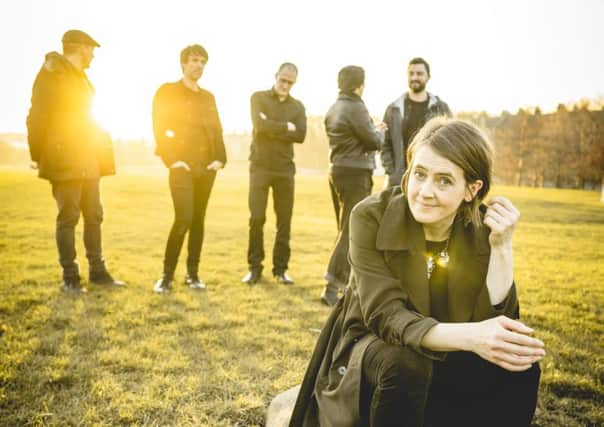Album reviews: Karine Polwart | Ty Segall | Nerija


Karine Polwart: Karine Polwart’s Scottish Songbook, Hegri Music ***
Ty Segall: First Taste, Drag City ****
Nerija: Blume, Domino ****
Karine Polwart has rightly been garlanded for her original works on record and on stage, but her talents as an interpreter of other artists’ songs are equally acute, not least in taking on the daunting beast that is Joni Mitchell’s Hejira for a Celtic Connections concert.
Advertisement
Hide AdAdvertisement
Hide AdHer latest project is even more ambitious yet also somehow more intimate. Karine Polwart’s Scottish Songbook has its roots in last summer’s Rip It Up exhibition on the history of Scottish rock and pop and the accompanying Light on the Shore series of EIF concerts at Leith Theatre, for which Polwart developed her own personal playlist of favourite and/or significant Scottish pop songs.
Now the concert has become an album, beautifully packaged in physical form with art and illustrations by Jen Frankwell and enhanced by extensive liner notes, stories inspired by the songs and related material.
A good number of tracks have been excised along the way. Sadly, her Altered Images and Associates covers haven’t made the cut but Polwart does cast her net across the years, taming big beasts from Biffy Clyro to Deacon Blue, honouring classic songwriters, throwing a couple of quirky curveballs and indulging her nostalgic love for her local heroes Big Country.
Understandably, the words are key for Polwart, who homes in on the smalltown melancholy of Chance and extrapolates storylines from more abstract lyrics. Strawberry Switchblade’s sugary pop confection Since Yesterday is repurposed as a dementia lament, opening with a recording of Polwart’s grandfather singing an Irish traditional song, while Frightened Rabbit’s Swim Until You Can’t See Land and Biffy Clyro’s Machines work almost as companion pieces, dragging hope out of despair.
But her stripped-back and deconstructed folk interpretations don’t always translate quite so well from concert to recording. The Waterboys’ classic The Whole of the Moon loses its epic exultation to become a wistful meditation. Deacon Blue’s rallying Dignity is a folk song of sorts anyway but sounds rather polite when denuded of its pop polish.
The delicate arrangements throw the songwriting talents into relief, with Gerry Rafferty’s beautiful Whatever’s Written In Your Heart a mellow, melancholy stand-out and Ivor Cutler’s simple yet profound Women of the World sensitively expanded beyond Polwart’s harmonium and Admiral Fallow frontman Louis Abbott’s hangdog vocal into a quietly powerful lullaby chorale.
In contrast to Polwart’s meticulous craft, US punk rocker Ty Segall knocks out album after album with devil-may-care DIY attitude. His latest, First Taste, captures all his live jamming spontaneity but adds a kitchen sink orchestra of seemingly random instrumentation, with bouzouki, koto, mandolin and recorder all pressed into service on these gonzo garage symphonies.
Advertisement
Hide AdAdvertisement
Hide AdTaste is a fairly straight-shooting fuzz guitar boogie, but Whatever is embellished by the urgent honk of horn and some tinny picking on banjo. There is a similar cavalier approach to instrumentation on I Worship the Dog, while dissonant blasts of brass contrast with the light motorik groove and multi-tracked falsetto vocals on Self Esteem. Lone Cowboys is the most fun of all, with its energy cocktail of braying saxophone, speed mandolin and low-slung punk momentum.
The seven members of Nerija have been playing together in various configurations for a number of years but coalesced as a collective round the Tomorrow’s Warriors initiative to encourage young women to play jazz.
Placing no limits on their style, Nascence is an agreeably airy opener with beseeching brass, the snake-hipped Riverfest combines fusion guitar, Afrobeat brass and skittering rhythms, while there are clear rock influences on the tripped-out guitar and soulful sax of EU (Emotionally Unavailable). Elsewhere on this debut album, the London-based group sound like they might have been just as at home in Greenwich Village in the 1950s. - Fiona Shepherd
CLASSICAL
Shanghai Symphony Orchestra: Gateways, Deutsche Grammophon ****
When the Shanghai Symphony Orchestra – older than the Berlin Phil – come to Edinburgh later this month, they will play an all-Western programme. In this debut album with Deutsche Grammophon, however, music director Long You embraces a delicious East-West musical dichotomy in the pairing of music by Rachmaninov and Chinese composer Qigang Chen. Chen is in his late 60s, so experienced both the constraints of the Cultural Revolution and the emerging cultural freedom of the 1980s, when he studied in France with Messiaen. Wu Xing (the Five Elements) fuses deliciously filigree Chinese characteristics with the heat of Messiaen’s sound world. The violin concerto – La Joie de la souffrance – is beautiful and beguiling, played with liquid exoticism by Maxim Vengerov. The orchestra is put to the test in Rachmaninov’s exuberant Symphonic Dances and responds with brazen energy, even if elements of the solo playing are a little soulless. - Ken Walton
FOLK
Mike Vass: The Four Pillars, Unroofed Records ****
A distillation of multi-instrumentalist and composer Mike Vass’s show for the Scots Fiddle Festival, this album warmly salutes the “four pillars” of Scots fiddle music – slow air, march, strathspey and reel. The tunes are Vass’s composed responses to the tradition, each section led by one of four solo fiddlers, elegantly complemented by pianist Tom Gibbs, Iain Sandilands on vibraphone (an unusual but effective element) and a richly integrated string quartet.
Vass himself leads his two marches, looping solo fiddle into a chorus of echoes in the first, vibes and quartet colouring the second, while Patsy Reid brings a stately Perthshire approach to that oft-neglected genre, the slow strathspey and requisite smeddum to the snappier kind. Shetlander Jenna Reid’s reels work up over pizzicato strings before a restrained but anthemic close.
A real highlight is the opening slow air, After Years, given full-toned yearning by Lauren MacColl over luminously spare piano and vibes. - Jim Gilchrist